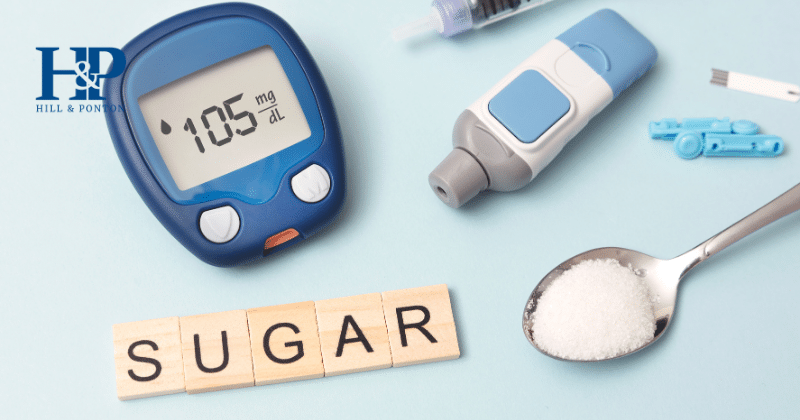Diabetes Mellitus is a widespread condition affecting the veteran community, particularly those from the Vietnam Era.
As these veterans age, diabetes increasingly becomes a part of their health landscape.
This article tries to demystify the VA’s rating system for type 2 diabetes, offering insights into service connection, compensation expectations, and how to secure a higher disability rating.
The Link Between Diabetes and Herbicide Exposure
Herbicide exposure has been linked to type 2 diabetes among veterans who served in Vietnam, Korea, and Thailand.
It’s a significant concern, as diabetes represents a prevalent service-connected disability among Vietnam era veterans, with over 400,000 veterans currently service-connected for it.
Moreover, over 28,000 Gulf War veterans are also recognized for diabetes service connections.
These numbers hint at the broader impact, not just on those recognized but potentially on thousands more unaccounted for.
Navigating VA Ratings for Type 2 Diabetes
Understanding the VA’s rating for diabetes is crucial for veterans seeking compensation.
The ratings, outlined in 38 CFR 4.119, Diagnostic Code 7913, range from 10% to 100%, reflecting the condition’s severity and the impact on the veteran’s life.
Rating Levels and What They Mean
- 10% Rating: Assigned when diabetes is manageable through diet alone.
- 20% Rating: Given when oral medications or daily insulin injections are prescribed alongside dietary restrictions.
- 40% Rating: Applicable when additional requirements of insulin, diet restriction, and regulation of activities are prescribed.
- 60% Rating: Reflects severe diabetes management issues, including hospitalizations or frequent care provider visits, alongside complications not compensable separately.
- 100% Rating: The most severe rating, indicating frequent insulin use, diet restrictions, activity regulation, hospitalizations, and significant health deterioration.
Proving a VA Disability Claim for Diabetes
Establishing a service connection for diabetes, especially years after service, can be challenging.
Here are steps to strengthen your claim:
- Medical Evidence: Compile all medical records related to your diabetes diagnosis and management.
- Service Connection: Demonstrate exposure to Agent Orange or conditions directly leading to diabetes during your service.
- Secondary Conditions: Include complications or secondary conditions resulting from diabetes, as these can impact your overall rating.
Seeking Professional Help
Given the complexities of VA claims, consulting with a law firm experienced in veterans’ disability rights can be invaluable.
A professional can guide you through the process, from establishing a service connection to appealing denied claims.
Were You Denied Benefits?
Your Time is as Important as Your Claim
Your moments are precious.
Don’t waste them on legal complexities trying to fight an appeal.
Get your free case evaluation with us today.
The Impact of Secondary Conditions
Diabetes can lead to various secondary conditions, such as renal dysfunction, neuropathy, and cardiovascular issues, which can also be service-connected.
Recognizing these conditions is crucial for a comprehensive disability claim:
- Renal Dysfunction/Kidney Issues: Diabetes can lead to nephropathy, affecting kidney function and potentially leading to chronic kidney disease or renal failure.
- Diabetic Peripheral Neuropathy: This condition involves nerve damage in the extremities, leading to pain, tingling, or numbness, primarily in the hands and feet.
- Erectile Dysfunction (ED): Diabetes can affect blood flow and nerve function, contributing to difficulties achieving or maintaining an erection.
- Hypertension (High Blood Pressure): There’s a strong link between diabetes and hypertension, with the latter exacerbating the risk of diabetic complications.
- Skin Conditions: Diabetes can lead to various skin problems, including bacterial and fungal infections, diabetic dermopathy, and necrobiosis lipoidica diabeticorum.
- Diabetic Retinopathy: This eye condition is caused by damage to the blood vessels in the tissue at the back of the eye (retina) and can lead to blindness.
- Heart Disease: Diabetes significantly increases the risk of various cardiovascular problems, including coronary artery disease with chest pain (angina), heart attack, stroke, and narrowing of arteries (atherosclerosis).
- PTSD (Post-Traumatic Stress Disorder): Recent studies have indicated that PTSD can increase the risk of developing diabetes.
- Strokes: The risk of strokes increases with diabetes due to the potential for blood clots and the damaging impact of high blood sugar on blood vessels.
- Foot Problems: Diabetes can lead to foot complications such as ulcers, infections, and even the risk of amputation due to poor circulation and nerve damage.
- Gastrointestinal Issues: Diabetes can impact the gastrointestinal tract, leading to conditions like gastroparesis, where the stomach takes too long to empty its contents.
- Cognitive Impairments: Long-term diabetes can affect cognitive function, leading to difficulties with concentration, memory, and decision-making processes.
Veterans battling type 2 diabetes have avenues for compensation and recognition of their condition as service-connected.
Understanding the VA’s rating system and the importance of a clear service connection can pave the way for receiving rightful benefits.
If you’re navigating this complex process, remember, you’re not alone.
Assistance is available to help you secure the benefits you’ve earned through your service.
Content Review
Cassandra Crosby, an Accredited Agent and claims advocate for Matthew Hill & Shelly Mark’s teams, reviewed the information provided in this post.






